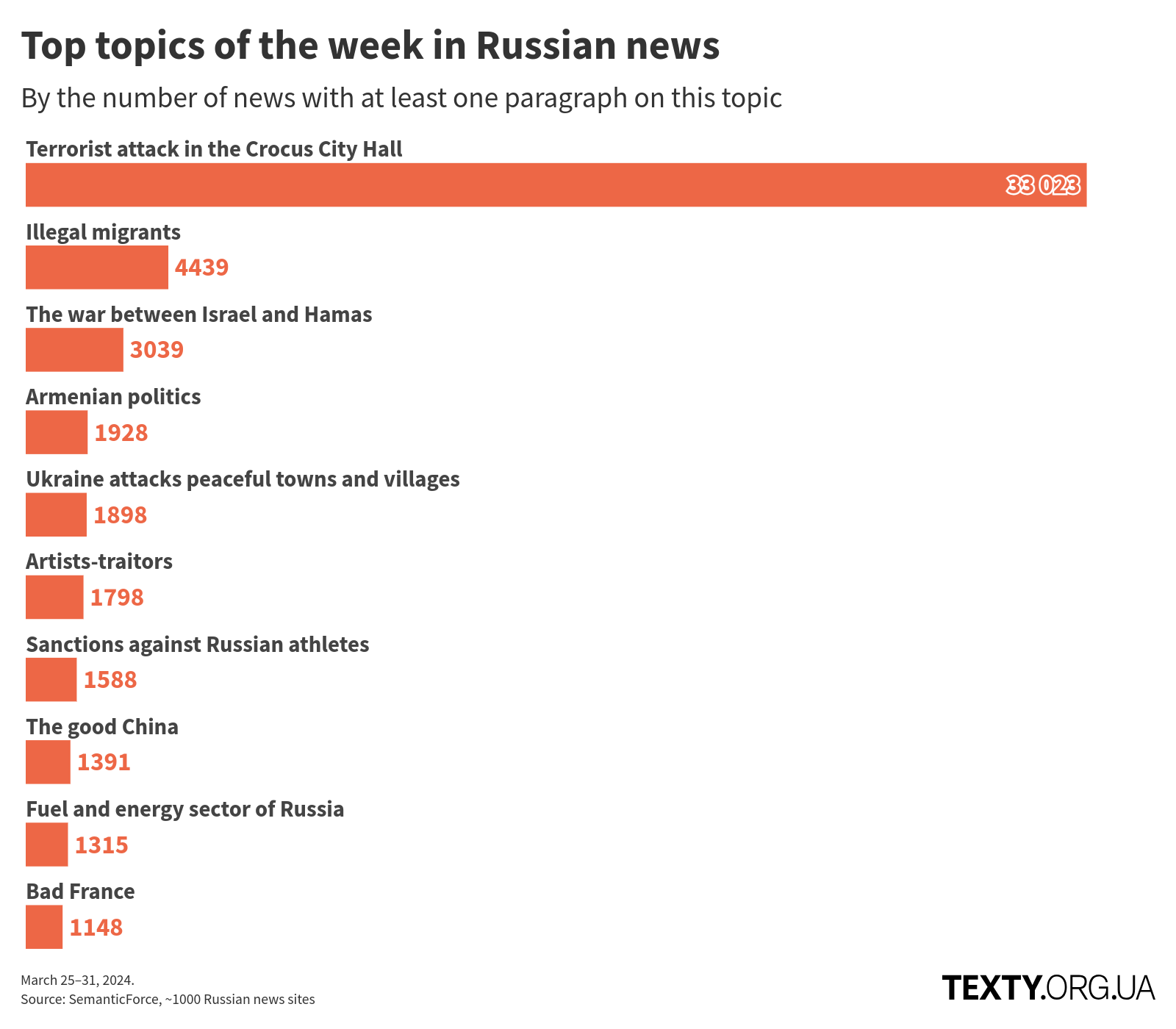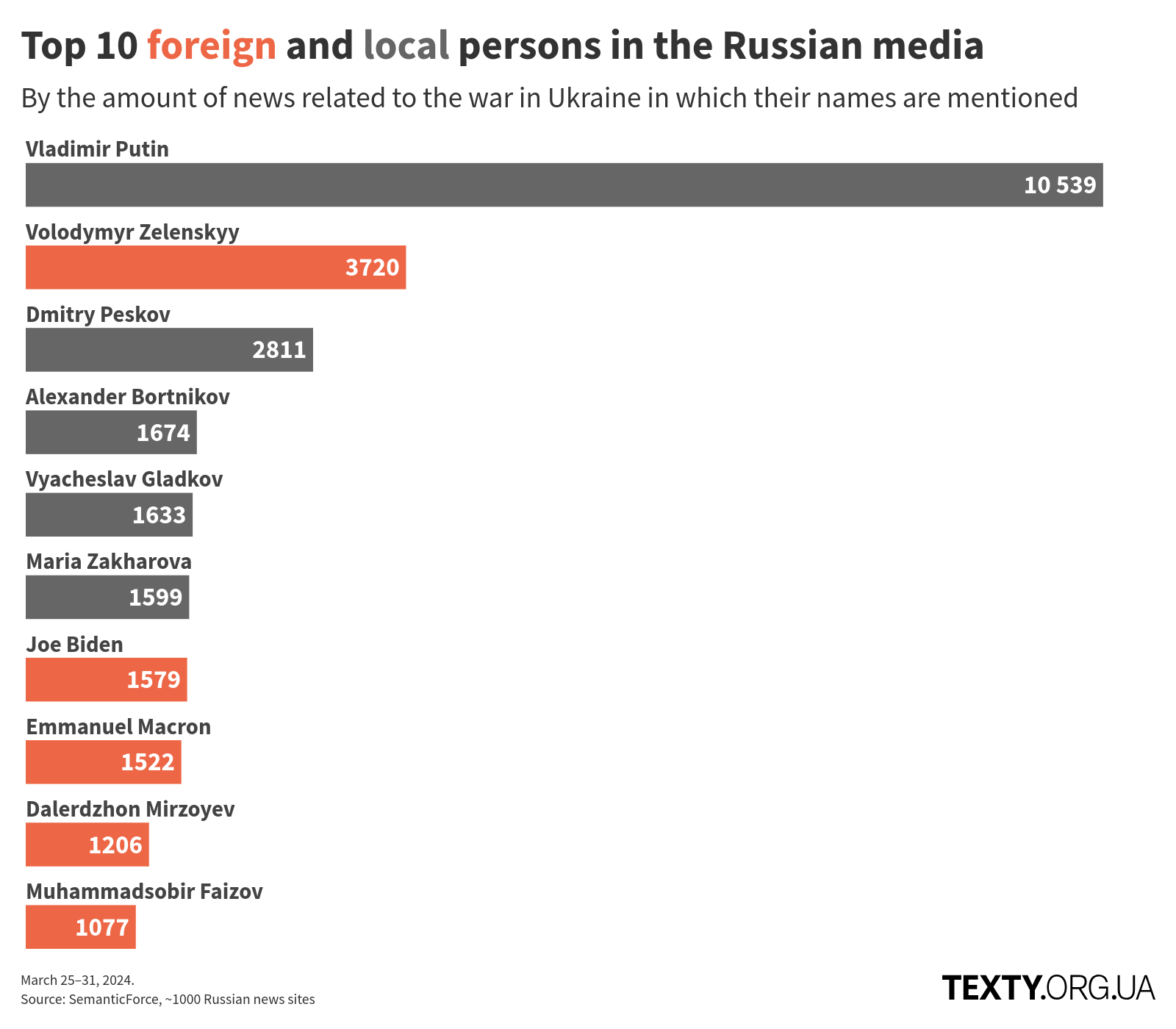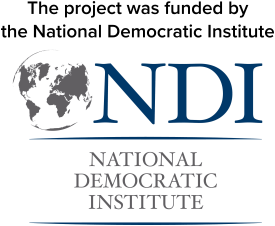Death penalty on the heads of Russia's enemies. Russian Media Monitoring Report, March 25-31, 2024
Last week, the Russian media discussed whether the death penalty should be brought back to Russia. The propaganda lamented that criminals should be severely punished rather than allowed to live in warm Russian prisons.
Also, after the terrorist attack in Crocus, there was talk of the need to tighten migration policy. And while Ukraine is accused of the terrorist attack in statements, Tajiks face physical violence. Russian law enforcement agencies have joined the anti-immigration hysteria. They even discussed the need to introduce a visa regime with Central Asian countries. We have also seen another surge in the information campaign against the Armenian leadership. Nikol Pashinyan joins the club of "Russophobes" and "traitors" to the Russian people.
Read about this and more in the new issue of our monitoring of Russian state media and manipulative websites that target Russian disinformation.

"Crocus City Hall"
The Russian propaganda industry is focusing on accusing Ukraine of the March 22 terrorist attack at the Crocus City Hall concert hall in Krasnogorsk. In our previous monitoring, we wrote that immediately after the attack, Russian propaganda pointed to Kyiv's involvement in the murder of Russians at the concert.
The situation has changed little in a week, despite ISIS' repeated claims that it organized the attack. And while the story of the "Ukrainian trace" used to be one of the main versions, today, disinformers are talking about it as a fait accompli.
The more reports appear that ISIS is to blame for the attack, the more propaganda accuses Ukrainians: "The United States is trying to convince its satellites and other countries through various channels that, according to its intelligence, there is no Kyiv trace in the Moscow attack, that followers of Islam carried out the bloody terrorist attack, members of the ISIS organization banned in Russia", "The investigation has confirmed data on the receipt of significant amounts of money and cryptocurrency from Ukraine by the perpetrators of the attack, which were used in the preparation of the crime."
As proof of this version, the propaganda reminds us of the alleged elimination by the SBU of such individuals as Ilya Kiva, Daria Dugina, and Vladlen Tatarsky. The main message is that if they killed them, then they killed them in Crocus: "The head of the SBU, Vasyl Malyuk, unofficially recognized the SBU's responsibility for the murder of former MP Ilya Kiva and military officer Vladlen Tatarsky."
This is not the first time. For example, after the terrorist attack in Beslan in September 2004, Foreign Minister Sergei Lavrov spoke of Georgia's possible involvement in it. In 2010, Secretary of the Security Council Nikolai Patrushev stated that the investigation sought a "Georgian trace " in the explosions at the Moscow Lubyanka and Park Kultury metro stations. In those years, relations between Russia and Georgia were damaged after the 2003 Rose Revolution in Georgia, especially after Russia's war with Georgia in 2008.
Z-bloggers, media, officials, and politicians are trying to prove to the Russian leadership that they believe in the "Ukrainian trace" by supporting the line of official state propaganda. If you do not think that Ukraine committed the terrorist attack, you are not a true patriot.
The Russian media even involved allegedly Chinese experts who doubted that ISIS terrorists were behind the attack: "Chinese experts doubted that the Islamic State (IS) terrorist organization, banned in Russia, was behind the attack. This crime does not quite match the patterns of its previous attacks, which usually involve 'lone wolves' or suicide bombers."
And allegedly, Egyptian experts report that Ukraine has long been recruiting Islamists: "Egyptian expert on Islamist groups Ahmed Ban, commenting on the terrorist attack in the Moscow region, suggested that Ukraine, which the US is trying to turn into a second Afghanistan to counter Russia, had previously used Salafists to fight Russia, and that the terrorists recruited new people, not experienced militants, to attack to avoid direct contacts between the leadership and the perpetrators."
By shifting the blame to Ukraine, the propaganda fulfills its main objectives: further discrediting Ukraine and mobilizing Russians to fight the "Kyiv regime."
Consequences of the terrorist attack in society
After the terrorist attack, Russian propaganda switched to two topics.
The first is the return of the death penalty in Russia: "The leader of Just Russia - For Truth, Sergei Mironov, proposed to execute those who carried out the terrorist attack in Crocus City Hall. ... The argument of those who say that life imprisonment is almost worse than the death penalty is that the prisoners will suffer all their lives. Look at their faces - they will eat their rations and be happy." "Deputy Chairman of the Russian Security Council Dmitry Medvedev believes that it is necessary to kill all those involved in the terrorist attack."
Proponents of the idea of introducing such a punishment point to the fact that "often people are released after being imprisoned for violent crimes, and it is unfair when the murderer is then free and enjoying himself." They forget to tell us that in Russia, cannibals, pedophiles, and serial killers are now legally released from prison. Prisoners under various articles are granted amnesty for participating in the war against Ukraine. And in general, Russian society supports such steps by the authorities.
The second problem that arose after the terrorist attack in Crocus is migration policy. Russian politicians and propagandists immediately began to demand a stricter migration policy. Russian media do not absolve Ukraine of the blame for the attack but point out that Tajiks have become a tool in the hands of Ukrainians. Therefore, migrants should be checked for loyalty to Moscow: "One of the main goals of involving the Tajiks in this operation was to cause 'destabilization of the internal situation by aggravating the relations between the population and migrants. ... Only a very experienced and cunning player can do this."
In the past, Russia has actively used migrants who wanted to transit to other countries to artificially create a crisis in Europe. Finland even closed its border with Russia to prevent destabilization. Now, Russian society is asking what happened to these migrants: "The day before, the Russian media reported on tens of thousands of migrants from Afghanistan, Iraq, Syria, Somalia, and other countries who had accumulated on the Russian border with Finland. A natural question arises: on what grounds did these people from far abroad enter Russia? Who invited them? Who gave them entry visas? Who provided them with transportation and bicycles in the border area? Where did they go after the Finnish-Russian border was closed? Where are they now?", "By the way, a lot of questions are raised about how people who do not speak Russian at all could get our passports."

Even the church has joined the anti-immigrant struggle: "Patriarch Kirill of Moscow and All Russia said that the situation with migrants who do not speak Russian and do not respect Russian culture has become worse over the past year."
Dissatisfied people point out that migrants are actively used by anti-Russian forces: "Kyrgyz citizens have been recruited through social networks to commit terrorist acts in Russia."
The long-standing demand to introduce a visa regime with Central Asian countries is becoming louder. But we can assume that this will not happen and the topic will soon come to a naught.
Currently, the Russian government tolerates all attacks against migrants, allows them to "let off steam," and sometimes even plays along. For example, security forces conduct demonstrative raids on people from Central Asia.
However, the Russian Federation needs migrants as a labor resource. In 2020, up to 78% of Russians were in favor of limiting the inflow of migrants, introducing a visa regime, quotas, and other restrictive measures. At the same time, almost half of Russians agree that "the work of migrants is useful for the country and society."
Armenia joins the club of "Russophobes"
Russian propaganda is focusing on a campaign to discredit the Armenian leadership. "Sergei Lavrov said that Armenia is leading to the collapse of relations with Russia under pretenses."
This is a consistent information policy that began in the fall of 2023. Back then, Yerevan lost the lands of Nagorno-Karabakh to Azerbaijan. Russian disinformers justified the lack of assistance from Russia by saying that Nikol Pashinyan, the Prime Minister of Armenia, did not fight for Karabakh and had always planned to betray the interests of the Armenian people.
After those events, the Armenian leadership drew conclusions and began to publicly state that Russia does not take into account Yerevan's interests, the CSTO is incapable of functioning, and it is better to be closer friends with the EU.
Anti-Armenian propaganda in the Russian Federation led Yerevan to react and ban the author's programs of Kremlin propagandist Vladimir Solovyov. Solovyov hypocritically replied that "many Armenians know Russian and are used to listening to and watching Russian TV programs. Therefore, such actions of the authorities are a direct violation of freedom of speech".
Today, propagandists claim that Pashinyan is dragging the country into NATO: "According to the plan, the Armenian military periodically holds consultations with the alliance on regional security issues, works on creating a new military doctrine, etc. There has been no talk of joining the organization yet, but Armenia has made its choice, and now it can only hope that its proximity to NATO will guarantee security."
In this context, the Russian media began to intimidate Armenia and assure it that NATO could not save others before Russia's response: "Proximity to NATO does not guarantee security, but it can definitely ensure that you get involved in a local war in the interests of the alliance, and not necessarily with a victorious outcome."
The Methodology
To monitor the information published on disinformation websites, we analyzed approximately 500,000 news reports collected from ~ 1,000 Russian websites. The data for the analysis was collected and provided by SemanticForce.
Each paragraph was processed using an algorithm which defines its topic automatically. The resulting topics (i.e. groups with similar content) were short-listed by the topics relating to the war or its consequences for Russia. The number of mentions of a certain topic was then counted for each publication. Our conclusions are based on the respective findings and the quotes from paragraphs referring to each topic.

This article was originally written in Ukrainian. It has been translated into English using AI tools such as DeepL, ChatGPT, and Grammarly. If you encounter an error that requires immediate attention, please inform us via Facebook, Twitter, or Instagram. Your understanding and support are appreciated.





